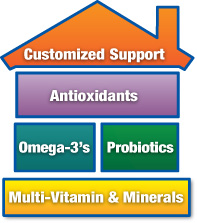
Turns out Mom had more of a point than she knew when she told you to eat your veggies.
A new study in the journal Stroke has found that diets rich in antioxidants from fruits, vegetables and whole grains appear to lower a woman’s odds for a stroke, even if she has a prior history of heart disease.
The Swedish study involved more than 31,000 women without heart disease plus almost 5,700 women with a history of heart disease. The women, aged 49 to 83, were followed for about 10 years.
During the follow-up, more than 1,300 strokes occurred in the heart disease-free group and more than 1,000 strokes occurred in the heart disease group. (Remember there were 6X as many women in the heart disease-free group).
The researchers then used dietary information to determine the women’s “total antioxidant capacity (TAC),” a measurement of the power of these food-borne compounds to cut down on disease-linked “free radicals” in cells. Cell damage caused by free radicals can lead to inflammation and damage and stiffening of blood vessels.
Among women with no history of heart disease, those with the highest levels of diet-based antioxidants had a 17 percent lower risk of stroke than those with the lowest levels.
Benefits extended to women who’d already suffered heart disease. Among this group, women with higher levels of dietary antioxidant capacity had up to a 57 percent lower risk of hemorrhagic (bleeding) stroke compared to those with the lowest levels.
According to the study authors, fruits and vegetables contributed about 50 percent of antioxidant capacity in women with no history of heart disease who had the highest TAC. Other contributors included whole grains (18 percent), tea (16 percent) and chocolate (5 percent).
The study did not take supplements into account, and past studies that did have shown mixed results depending on which particluar antioxidants were being studied.
 Antioxidants are an important part of our recommended “Blueprint For Health” – taking up the entire 2nd floor of our plan.
Antioxidants are an important part of our recommended “Blueprint For Health” – taking up the entire 2nd floor of our plan.
Vitamin C, as well as Vitamin E have shown great promise fighting heart disease.
Astaxanthin (as in Krill Oil) has been shown to help lower blood pressure and have other cardiovascular benefits.


Leave a Reply
You must be logged in to post a comment.